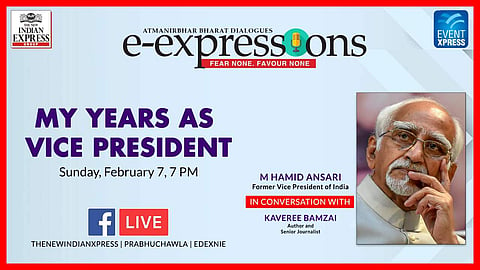

Flying the flag at the top of Red Fort on Republic Day was akin to the violence that erupted on Capitol Hill in the USA, said former Vice President of India, M Hamid Ansari. "There have been subsequent debates as to how those people could reach that particular point in the Red Fort that is not easily accessible. Someone must have failed and it was almost like India's Capitol Hill moment," says Ansari. He was in conversation with Senior Journalist and Author Kaveree Bamzai as part of The New Indian Express' webcast series E-Expressions about his book By Many A Happy Accident: Recollections Of A Life.
Answering a question about the farmers' protest following the Farm Bills, Ansari said, "As a principle, I do not comment on the work of my successors. The public knows what happened and what didn't happen. What has happened after that and the expression of public opinion that has (been) emanated by thousands of people, there's surely something to it."
Speaking about his role as a public intellectual and how important multiple viewpoints are to the functioning of democracy, Ansari says, "An alternate viewpoint has always been important in a functioning democracy. It might not be that important in a non-democratic society, but ours is a democratic society and a proud one too. The option of transforming intellectual inputs into alternates is critical. This has always been my observation about the need for parliamentary debates. The legislative process is a very acute one. The proposed legislation is drafted with utmost legal and political care by experts, covering all possible angles. But when it comes to the house, (which is) a body of people with varied experiences, they can tear it to bits or even add (to it)."
Recollecting some moments right after he became Vice President and sharing some insights about his relationship with Prime Minister Narendra Modi, Ansari says, "Just after I was elected, I had received calls from various chief ministers and political personalities. Among the early callers was the then chief minister of Gujarat, Narendra Modi. At that time, Godhra was very fresh in everyone's minds and I asked him why he did it. His response was what I have recorded, 'People only look at this and not my good work'. He then told me about how he helped some poor girls of a particular community get an education. I asked him why he doesn't publicise this side of him and he told me that it doesn't suit his political personality. But we shared a cordial and good relationship."
Answering a question about some problems he might have faced during his tenure, Ansari says, "I wouldn't call them hiccups. The leader of a ruling party or the opposition party looks at things from one manner. My point of view, as the chairman of the Rajya Sabha, is that of a referee at a hockey match. I'm not a player but I watch the match very closely. I have a whistle and a rulebook and when fouls are committed, I have to blow the whistle. We were just looking at things from different angles."
Mentioning his farewell and the speeches made by the Prime Minister on the occasion, Ansari says, "I was discomforted because it was not an occasion to talk about ideologies. He made two speeches that day. One which got publicised and the other at another farewell organised at the parliament where the Prime Minister spoke very differently. I have spoken about it in my book, By Many a Happy Accident. There is even a photo in the book. There is a misperception that there were some anger and animosity."
Commenting on the Muslim community and especially the role and responsibility of women, Ansari says that they have to do more to integrate better. "There are issues like the feeling of insecurity, which is the responsibility of the state but there are other aspects like lagging behind in education, especially women. While delivering a speech in Kozhikode, I presented a lot of data about how Muslim women are lagging behind than the rest of the Indian community. They are not sufficiently educated, they don't participate in public life and they don't leave their homes to participate in public. An atmosphere has to be created for this to happen. Gandhiji did it, the freedom movement did it, a year ago we saw it in Delhi. The demand for participation in civic life is a very healthy development," he says.
